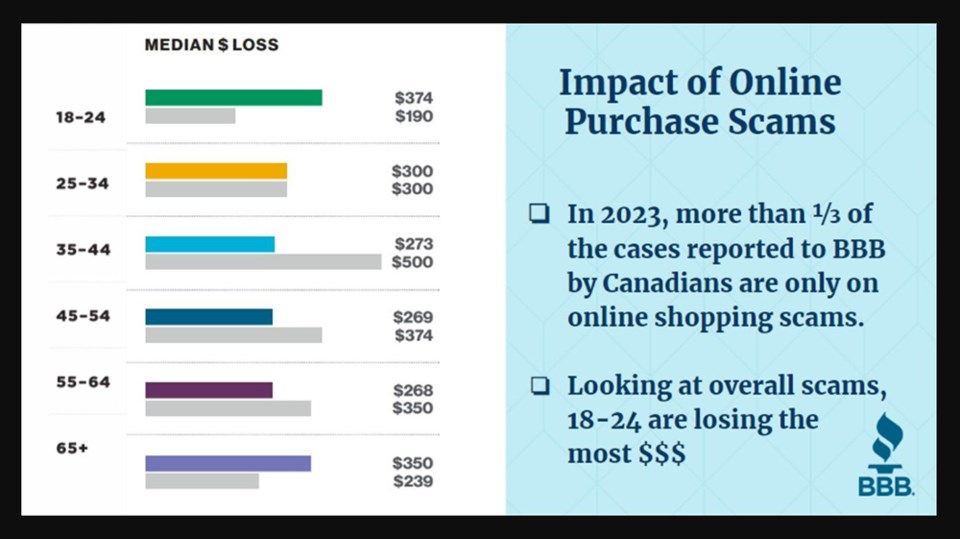September is near and students are gearing up to return to class. Though it’s an exciting time of year, it also opens the door for potential challenges.
This busy time has become a prime opportunity for scammers looking to take advantage of students returning to school. Three common scams that students face are rental, online purchase and employment scams, according to the Better Business Bureau (BBB).
"As students return to class they are often juggling multiple priorities such as finding an apartment, attending classes, securing jobs and settling into their new spaces, that they may be pushing caution aside as they attempt to make quick decisions or get the best deals," said BBB spokesperson Neesha Hothi.
"Scammers see this as an opportunity to exploit students whose minds are too preoccupied to spot the scam."
The BBB is out to help with these tips on how to spot scams targeting students:
Rental scams
Rental scams can cause a lot of financial damage as students search for a place to live for the school year.
Stay alert and safe with these BBB tips when looking for a rental:
- Always see the property in person or send a friend. An online advertisement can be a dupe and may not accurately depict the space. Check the space to confirm all the details.
- Don't send any money via cash transfer apps. Always use established financial institution apps to transfer your money, always send to a matching email address, and never send money to someone out of the country.
- Ensure a proper tenancy agreement is drafted and signed by both parties. This agreement should include names and addresses for the landlord.
- Search online for similar postings. Scammers may use the images and content of a rental posting from another region to create a fake listing. Their goal is to have you enter an agreement to rent the space and send over the first month’s rent and security deposit, after which they might disappear - with your money.
This Vancouver student was scammed in 2023 and is a perfect example of how scammers operate:
"I was on my vacation in Brazil and I needed a place to live when I came back to Vancouver. I looked on Kijiji and I found a room for rent there.
"I talked to the owner through the website, email and text message. I had to make the rent's deposit and the security deposit through PayPal but due to some problems I deposited to his daughter's bank account. Also, he sent me a lease contract to sign
"But when I got there on September the house did not belong to the alleged tenant."
Online purchase scams
In 2023, online purchase scams were among the most popular types of scam reported throughout the year, with the 18- to 24-year-olds listing the most.

Practice caution when shopping online and always try to use reputable websites:
- Don’t shop on price alone. Scammers offer hard-to-find products at great prices.
- Avoid spontaneous purchases while browsing social media. Scammers advertise websites that offer great deals hoping you’ll buy without a second thought. They either don’t deliver the product at all or will deliver counterfeit products.
- Don’t buy online unless the transaction is secure. Make sure the website has “https” in the URL (the “s” is for “secure”) and a small lock icon on the address bar. However, even secure websites can be fraudulent, so always do your research on the company before buying.
- If using an online marketplaces, see the product with your own eyes first and don’t pay upfront or “holding” fees. Look for irregularities in the post or excuses for scheduled meet-ups from the seller to spot the scam.
- Use a credit card for payment. Credit card purchase are traceable, meaning they can be digitally tracked so you know exactly what you are being charged for and by what site. Many credit cards also offer fraud protection and purchase insurance, meaning you may have a way to get your funds back should something be amiss. Always report any suspicious transactions.
Employment scams
Employment scams are rising in notoriety amongst students.
Two of the most common examples are:
- when scammers ask you to pay for equipment you need such as laptops or other technology with the promise of being reimbursed with your first cheque. That cheque may come but may not be cashable and you will be out the costs of this "equipment"
- when scammers mimic other job postings or create a fake one, with the intention of garnering your banking details and personal information
Consider these tips to protect yourself against employment scams:
- Watch out for imposters. Check the company’s official job board to confirm a job posting. Scammers will steal public company information to mimic a listing to gain your trust and then garner your personal information.
- Research the company. What are others saying about this company on online job sites? Search the company at BBB.org.
- Check for legitimacy. Where is your contact emailing you from, a formal company email or a personal account. Have you had a proper interview? Having at least one formal interview is a good sign that the company is reputable and safe. Do they have a signature with a company phone number? If you are concerned, call the company’s main line and ask for your contact.
- Don't pay any upfront fees. Legitimate businesses will never ask you to cover any costs to gain their employment. If they do, it’s a sign to move on.
- Never deposit fishy or unexpected cheques. Scammers will send fake cheques to gain your trust and ask you to buy needed equipment for your new role through links they’ve provided. Only once you cash the cheque do you find out that the money has bounced, leaving you on the hook.
Students should stay alert and watch for signs of a scam. Head to BBB.org to find reputable businesses for back-to-school needs and be sure to report to the BBB Scam Tracker if you encounter a scam.



